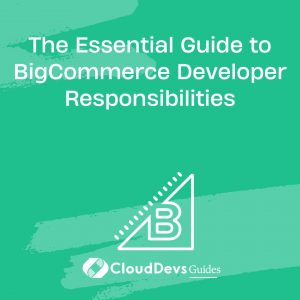The Essential Guide to BigCommerce Developer Responsibilities
BigCommerce, as one of the leading eCommerce platforms globally, offers a plethora of features designed to provide online store owners with an efficient, scalable, and intuitive solution for their eCommerce needs. A BigCommerce developer’s role, therefore, goes beyond mere coding. They are essential players in the design, development, deployment, and even the marketing phases of an online store.
In this blog post, we will delve into the main responsibilities of a BigCommerce developer. While there are many duties that can fall under this title, we’ll explore the most crucial ones, supported with examples to give you a clear understanding of what these professionals bring to the table.
1. Custom Theme Development
Every brand desires to stand out. BigCommerce developers are often tasked with creating custom themes that resonate with a brand’s identity, ensuring the online store is both functional and aesthetically appealing.
Example: A high-end luxury watch brand might want a sleek, minimalist theme, emphasizing product imagery and descriptions. A developer would not only incorporate these design elements but also ensure quick load times and smooth navigation.
2. Integration with Third-Party Applications
For an online store to function seamlessly, integration with various third-party apps such as CRMs, ERPs, payment gateways, and marketing tools is essential.
Example: A BigCommerce store might need integration with Salesforce to manage customer relationships and HubSpot for inbound marketing. Developers ensure these integrations are smooth, functional, and do not disrupt the user experience.
3. Developing Custom Extensions and Plugins
Sometimes, out-of-the-box features aren’t enough. BigCommerce developers can create custom extensions and plugins to provide additional functionality tailored to a business’s needs.
Example: A bookstore might want a feature where readers can preview a few pages of a book. A BigCommerce developer can create a custom extension to enable this feature, enhancing the user experience and potentially increasing sales.
4. Site Maintenance and Optimization
As with any online platform, regular maintenance is vital to ensure that the site functions optimally, remains secure, and provides a consistent user experience. This includes updates, bug fixes, and performance optimizations.
Example: Over the holiday season, an online store might experience increased traffic. Developers will optimize the site to handle this surge, ensuring that the site doesn’t crash and that load times remain fast.
5. Responsive Design Implementation
With a significant chunk of online shopping done via mobile devices, ensuring that an online store is mobile-responsive is paramount. BigCommerce developers ensure that the store’s design is fluid across devices – desktops, tablets, and smartphones.
Example: An apparel brand might release a new product line, and their marketing campaign could lead to a surge in mobile visitors. The developer ensures that these users have a seamless browsing and shopping experience, irrespective of their device.
6. SEO Best Practice
An online store’s success isn’t just about its design or features. Visibility on search engines is crucial. While BigCommerce already provides robust SEO features, developers can enhance these by implementing advanced SEO techniques.
Example: Implementing schema markup for products can enhance search engine results, displaying rich snippets like product ratings or price. A developer can integrate this, potentially increasing click-through rates.
7. Security Measures
Ensuring that customer data and transactions are secure is a top priority. Developers play a pivotal role in integrating SSL certificates, ensuring secure payment gateways, and implementing other security measures.
Example: After a high-profile security breach in the news, an online store may want to reassure its customers. Developers can integrate advanced security features, like two-factor authentication or encrypted data storage, boosting customer confidence.
8. Data Migration
For businesses transitioning to BigCommerce from another platform, developers assist in migrating product data, customer data, order histories, and other essential information without any hitches.
Example: A retailer moving from Shopify to BigCommerce would require a smooth transition to ensure business continuity. Developers ensure that product SKUs, images, customer reviews, and other data are accurately migrated.
9. Continuous Learning and Adaptation
The world of eCommerce is continually evolving. BigCommerce developers need to stay updated with the latest trends, tools, and best practices to provide the best solutions to their clients.
Example: BigCommerce might release a new API or a feature update. Developers, by staying updated, can leverage these new tools and features for their projects, ensuring their clients always have the best and latest functionality at their disposal.
Conclusion
A BigCommerce developer is not just a coder; they are a brand’s technical partner, ensuring that the online store is not just functional but thriving. From design to deployment, from marketing to maintenance, their role is multifaceted and integral to the success of any business choosing BigCommerce as their eCommerce platform. Whether you’re looking to hire or become a BigCommerce developer, understanding these key responsibilities is crucial.
Table of Contents







